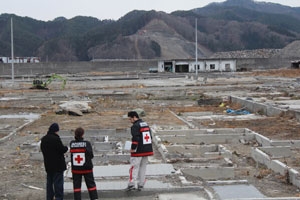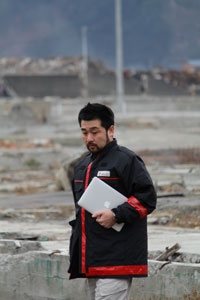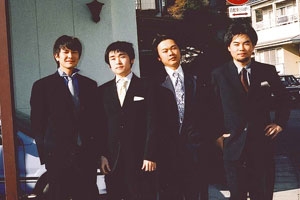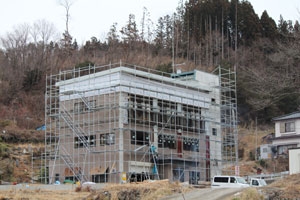Japan One Year: Diary 1
Coming to terms with tragedy
by Francis Markus in Otsuchi
2012/01/31

Tomokazu Sato paces over the concrete foundations that are all that remain of the house where he grew up until the age of 18. “It still doesn’t seem real, I can hardly believe this has happened.”
“My grandmother was in the house by herself, because my mother had just gone up the hill to renew her driving license,” says the stocky bearded 35-year-old Japanese Red Cross staff member.
(Photo: In Otsuchi, one of the worst-hit towns, much of the debris has now been cleared, with only the foundations left of many of the houses which were destroyed by the tsunami.)

Lost life in Disaster
Tragically, she lost her life in the disaster. Other family members were safe, including his younger brother, who is now working long hours in the local government office housed in prefabricated buildings, where he struggles to bring order to the town’s finances.
Sato himself has long lived in Tokyo, working at Red Cross headquarters. With his knowledge of this northeastern area, he was drafted into the front line of the emergency response and recovery efforts following the disaster. He was with the first Red Cross relief team to reach Otsuchi, three days after the tsunami devastated his home town.
As Sato stands in the road in front of the empty space where his house once stood, he holds up his laptop computer with a photograph of himself at the age of 20, together with three of his best friends, all dark suited, at their coming of age day celebration.
“The guy on the right lost his mother and sister, the guy on the left’s father and elder brother are still missing.” Sato explains that the the fourth member of the group died in a car accident eight years ago. “His grave has been washed away.”
(Photo: Tomokazu Sato paces over the concrete foundations that are all that remain of the house where he grew up until the age of 18. “It still doesn’t seem real, I can hardly believe this has happened.”)

Story of sacrifice
Although almost all the debris has been cleared since my last visit here in August, except for mounds of rubble and metal being sorted by heavy machines, the landscape tells a story of lives sacrificed.
“One volunteer fireman died, trying to plug a gap in the tsunami barrier over there, even though it was not a very high barrier. But he viewed that as his responsibility.”
Another volunteer, the man who used to cut Sato’s hair perished when he went to help rescue an elderly bed-ridden person. “So many good-hearted people were lost,” he says numbly.
Many people made the wrong decision at the wrong time. “Our next door neighbours came back to pick up some valuables. Only their car was found.”
(Photo: This photo was taken outside Tomokazu Sato's house in Otsuchi, when he and his friends were 18; now, he recounts that two of the young men in the picture have lost close relatives in the tsunami, while the third was himself killed in a car accident eight years ago and his grave has been washed away.)

Still no Decision on Land
The local government has still not decided what to do with the empty land, which is now deemed too dangerous to live on. “But it remains our property,” says Sato. He says his mother claims she would like to come back, “but at the same time, it’s too scary.”
As Sato looks round towards the wooded slope across the road that borders the town, it’s as if he still can’t quite take in the enormity of what’s happened. “When I was little, we were told that if a tsunami came, we should evacuate up that hill. Nobody thought a tsunami could come up so high…”
But there’s no time to think about that further now. We have to move on the next town where he has work to do, overseeing the handover of six school buses to the community, donated by the Japanese Red Cross.
(Photo: This house, which was damaged by the tsunami, is being repaired, even though the govermnent has said the area in which it stands is not safe for people to live. There's still little clarity about plans for reconstruction in the worst-hit areas.)
Poem expresses Spirit
In the car, a Japanese colleague quotes for me a snatch of a famous poem by the early 20th century poet, Kenji Miyazawa, who came from this part of the country. It starts:
“Be not defeated by the wind, be not defeated by the rain...”
Then there’s a bit which runs:
“In the East, if there is a sick child,
Go there and take care of him,
In the West, if there is an exhausted mother,
Go there and relieve her of her burden.”
Miyazawa, who was also a social activist, was coming from a Buddhist perspective rather than a Red Cross one. But I still think he would definitely approve of Tomokazu Sato’s spirit.















